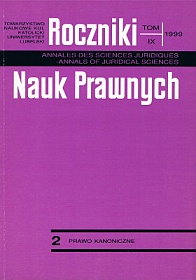The Legal Regulations Concerning the Eucharist at the Lvov Council of 1765
Abstract
The Tridentine reform as regards the storing and cult of the Eucharist has been properly dealt with in the councillor legislation of the Lvov archdiocese of the Latin rite. The legal regulations as regards sacramentology at the council of Archbishop Wacław Hieronim Sierakowski touched upon the most essential issues regarding the performance and cult of the Holy Sacrament. The lawgiver demonstrated a great feeling for the situation in drawing attention to the then pastoral needs. Moreover, the resolutions concerning the Eucharist were supposed to make the clergy and the lay people more aware of how to take advantage of that sacrament in a more fruitful manner. It was the lawgiver's intention to make the Eucharist the centre of the religious life through the presence of Jesus Christi in the Eucharist in the Church. A mature Christian faith should be derived from the worship to the Holy Sacrament, expressed by a good preparation of the priests to perform it. and the faithful lay people to often receive the Holy Communion. Other religious practices regarding the worship to the Holy Eucharist arc the following: festive Eucharistic processions and bringing the Holy Communion to the sick. The Council pointed also to the most suitable and careful manner of storing the Eucharist in churches.
Analyzing the councillor legislation of Archbishop Wacław Hieronim Sierakowski of 1765, as regards this section of sacramentology, one should say that it was inspired by the resolutions of the Tridentinc Council. It was based on the teaching of the popes, especially Pope Benedict XIV, and included the particular law of the earlier council of the Lvov archdiocese.
Copyright (c) 1999 Roczniki Nauk Prawnych

This work is licensed under a Creative Commons Attribution-NonCommercial-NoDerivatives 4.0 International License.


